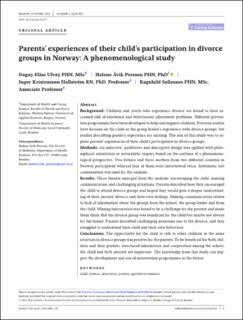| dc.contributor.author | Ulvøy, Dagny-Elise | |
| dc.contributor.author | Persson, Helene Åvik | |
| dc.contributor.author | Hallström, Inger Marianne Kristensson | |
| dc.contributor.author | Sollesnes, Ragnhild | |
| dc.date.accessioned | 2023-06-09T12:08:40Z | |
| dc.date.available | 2023-06-09T12:08:40Z | |
| dc.date.created | 2023-04-22T22:16:07Z | |
| dc.date.issued | 2023 | |
| dc.identifier.citation | Scandinavian Journal of Caring Sciences. 2023, 1-10. | en_US |
| dc.identifier.issn | 0283-9318 | |
| dc.identifier.uri | https://hdl.handle.net/11250/3070764 | |
| dc.description.abstract | Background Children and youth who experience divorce are found to have increased risk of emotional and behavioural adjustment problems. Different prevention programmes have been developed to help and support children. Previous studies have focused on the child or the group leader's experience with divorce groups, but studies describing parent's experience are missing. The aim of this study was to explore parents' experiences of their child's participation in divorce groups. Methods An inductive, qualitative and descriptive design was applied with philosophical orientation in naturalistic inquiry based on the outlines of a phenomenological perspective. Two fathers and three mothers from two different counties in Norway participated whereof four of them were interviewed twice. Systematic text condensation was used for the analysis. Results Three themes emerged from the analysis: encouraging the child, missing communication and challenging situations. Parents described how they encouraged the child to attend divorce groups and hoped they would gain a deeper understanding of their parents' divorce and their own feelings. Missing communication relates to lack of information about the groups from the school, the group leader and from the child. Missing information was found to be a challenge for the parents and made them think that the divorce group was beneficial for the child but maybe not always for the family. Parents described challenging situations due to the divorce, and they struggled to understand their child and their own behaviour. Conclusions The opportunity for the child to talk to other children in the same situation in divorce groups was positive for the parents. To be beneficial for both children and their parents, structured information and cooperation among the school, the child and both parents are important. The knowledge from this study can support the development and use of intervention programmes in the future. | en_US |
| dc.language.iso | eng | en_US |
| dc.publisher | Wiley | en_US |
| dc.rights | Attribution-NonCommercial-NoDerivatives 4.0 Internasjonal | * |
| dc.rights.uri | http://creativecommons.org/licenses/by-nc-nd/4.0/deed.no | * |
| dc.title | Parents' experiences of their child's participation in divorce groups in Norway: A phenomenological study | en_US |
| dc.type | Peer reviewed | en_US |
| dc.type | Journal article | en_US |
| dc.description.version | publishedVersion | en_US |
| dc.rights.holder | © 2023 The Authors | en_US |
| dc.source.pagenumber | 10 | en_US |
| dc.source.journal | Scandinavian Journal of Caring Sciences | en_US |
| dc.identifier.doi | 10.1111/scs.13173 | |
| dc.identifier.cristin | 2142634 | |
| cristin.ispublished | true | |
| cristin.fulltext | original | |
| cristin.qualitycode | 1 | |

